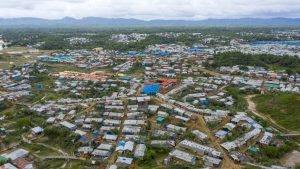Bangladesh’s interim leader Muhammad Yunus has warned of a severe worsening of the Rohingya refugee crisis due to a shortfall of international funding, urging immediate global action to prevent “a potential collapse” in the refugee camps on Bangladeshi soil.
Bangladesh is currently sheltering more than 1.2 million Rohingya, most of whom fled a military “clearance operation” launched by the Myanmar military in August 2017. Most now live in a state of limbo in a series of giant refugee camps around the city of Cox’s Bazar.
In a speech to the United Nations General Assembly (UNGA) on Friday, Yunus warned that due to ongoing conflict and discrimination in Myanmar, “the Rohingya crisis continues without any solution in sight.”
“The ongoing conflict in our neighboring country, Myanmar, threatens not only regional stability, but also the prospects for the safe return of the forcibly displaced Rohingya sheltered in Bangladesh,” he told the UNGA, according to the official transcript of this speech. Indeed, Bangladesh “faces a slow, but a regular flow of the Rohingya seeking protection,” due to the ongoing “deprivation of rights and persecution of the Rohingya rooted in cultural identity-based politics” in Rakhine State.
The latter was a seeming reference to the Arakan Army, a Rakhine nationalist group that now controls most of Rakhine State and has been accused of persecuting Rohingya still living in Rakhine State, and even committing war crimes against Rohingya populations. As a result, some 150,000 Rohingya have left Rakhine State over the past year, according to a Reuters report.
Yunus also raised an alarm about the deteriorating conditions in the camps around Cox’s Bazar, stating that funding cuts by international donors could soon slash food support to “a paltry $6 per person.” This could push many Rohingya “deeper into hunger, accentuating their malnutrition, and forcing them to resort to desperate measures,” as well as increasing “protection and security risks,” Yunus said.
“I call upon existing donors to come forward with enhanced contribution and potential donors to make announcements of generous contribution to prevent this catastrophic situation,” he added.
The situation in the camps has been deteriorating for some time, as the Rohingya crisis has been eclipsed by a succession of regional and global crises. In late 2023, the London-based International Institute for Strategic Studies (IISS) published a report stating that Rohingya refugees are “at their most vulnerable since the crisis began.” It identified a combination of waning international support and spike of criminal and militant activity in the camps.
The IISS report also said that refugees were suffering from the punitive policy of the Bangladeshi government, which in a perhaps vain bid to prevent the refugees from becoming de facto permanent residents, has imposed strict limits on the refugees’ movement, banned them from working, and prevented them from education or travel. It has also barred them from opening bank accounts and registering SIM cards, and prevented the construction of more substantial shelters in the camps.
Since taking office in Bangladesh last year, following the ouster of Prime Minister Sheikh Hasina during mass protests, Yunus has been vocal in his calls for the world not to forget the Rohingya crisis and is promises that Bangladesh is hoping
He was instrumental in organizing the high-level conference on the situation of the Rohingya and other minority groups in Myanmar, which is set to take place in New York tomorrow. The conference, which will be attended by senior U.N. officials, diplomats, and civil society groups (although reportedly no Rohingya refugees), will discuss how to address a refugee crisis that is seeming more permanent with every passing year.
In his speech, Yunus expressed an expectation that the upcoming conference “will galvanize global resolve and generate concrete international support for the Rohingya.” He said that it must also “agree on a process with time-bound deliverables as part of a globally accepted roadmap towards seeking permanent solutions to the Rohingya crisis.”
While funding levels are a function of political will, resolving the complex ethnic equations that exist in Rakhine State, and reversing “the process of marginalization of the Rohingya,” as Yunus put it to the UNGA, involve factors that are likely beyond the direct control of any foreign government or institution.
As the major authority in Rakhine State, much depends on the orientation of the Arakan Army (AA). In response to critics that claim it has persecuted and attacked Rohingya populations that have fallen under its control, the AA’s leadership insists that a future Rakhine nation would respect the rights of Rohingya Muslims. Whether refugees would be willing to accept the AA’s assurances remains at this stage highly uncertain, suggesting that the Rohingya crisis will drag on for some time yet.





























